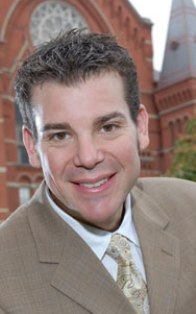
Tenor Marco Panuccio Sings In the Holidays
No sweeter
lullabies will be sung this season than were sung by tenor Marco Panuccio
Saturday night (Dec. 4) at St. Peter in Chains Cathedral downtown.

And no cozier “Chestnuts Roasting on an Open Fire,” or more expressive “Comfort Ye” from Handel’s “Messiah.”
The occasion was Panuccio’s first holiday concert in Cincinnati, “O Holy Night.”
Several hundred people braved the cold and the slick roads to hear Panuccio toast the season with pianist Carol Walker and organist Blake Callahan.
Panuccio, who came to Cincinnati in 1998 to study at the University of Cincinnati College-Conservatory of Music, has become one of the city’s favorite musical citizens. (There were “I’m a Fanuccio” buttons available at a table on the way into the church.) His rendition of “O Holy Night” was a highlight of the Cincinnati Symphony Orchestra’s annual “Home for the Holidays” show from 1999 to 2003 – hence the name of Saturday’s concert. He made his Cincinnati Opera debut in 2003 singing Pong in Puccini’s “Turandot,” and is now singing leading roles on opera stages around the world.
Panuccio’s program was diverse and extremely rewarding. There were arias, carols, secular songs, a song of Thanksgiving and one of Hanukkah.
There were four “Ave Maria’s,” including one presented as an encore. There were carols, most of them sung along with the crowd.
The very first words Panuccio sang, “Comfort Ye” from “Messiah,” startled the ears with their soft, vibrato-less purity. The recitative that followed was shaped with affecting drama, as was the chorus “Evr’y Valley,” where he demonstrated skillful coloratura.
There was more Handel with “Frondi tenere” (“Kind and loving branches”) and “Ombra mai fu” (“Never was there shade”) from the opera “Xerxes.” (In the opera, “Ombra mai fu,” also known as Handel’s Largo, is sung to a tree in gratitude for shading the singer.) As if to lavish the crowd with melody, Panuccio followed with Schubert’s exquisite “Ave Maria.”
His second set (following a sing along of “The First Noel” and “Joy to the World”) opened with Schubert’s “Mille Cherubini in choro” (“A choir of a thousand cherubs”). He ended this tender lullaby with a gently floated high note. “Adeste Fideles” (“O Come All Ye Faithful”) was sung solo, capped by Gounod’s “Ave Maria.”
Panuccio opened the second half with David Foster’s “Thankful” (2007), a beautiful, strophic nod to Thanksgiving. He dedicated “Ma’oz Tzur” (“O Mighty Stronghold”) to Hanukkah and to Alice Herz-Sommer, the world’s oldest Holocaust survivor, who celebrated her 107th birthday on YouTube this year by playing Chopin and expressing her belief in the innate goodness of mankind. Organist Callahan joined him in Franck’s subime “Panis Angelicus,” (“Bread of Heaven”) accompanied also by Cathedral chimes.
A secular set followed “Deck the Hall” (sing along). Panuccio crooned like the best of them in “Have Yourself a Merry Little Christmas” and “Chestnuts Roasting,” which helped one forget the freezing temperatures outside (and the drive home after the concert).
Another tender lullaby, “Gesu Bambino” followed “Silent Night,” then another “Ave Maria,” this time from Mascagni’s opera “Cavalleria rusticana” (the famous Intermezzo set to words). Panuccio let his voice soar in the Mascagni, ending falsetto.
In tribute, not only to the season, but also to the CSO show that unfortunately fell victim to budget cutting in 2004, he closed with “O Holy Night,” again letting his voice soar.
After a standing ovation he sang two encores. Virgil Thomson’s 1959 “Prayer to St. Catherine” has special meaning for him, he explained, having sung it on a recital in 1995 and recently visited the church in Siena, Italy where one of her relics is kept.
For Giulio Caccini’s “Ave Maria” -- considered a hoax, by the way, not written by the early baroque Italian, but passed off as such on a popular 1987 recording -- he was joined by countertenor Daniel Moody of Miami University, who sang from the balcony of the church. It was a deeply moving conclusion that made its own argument (along with the rest of the program) for an encore next year.